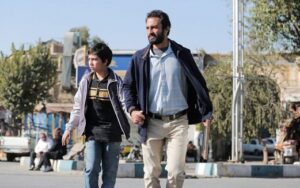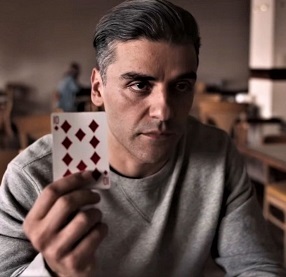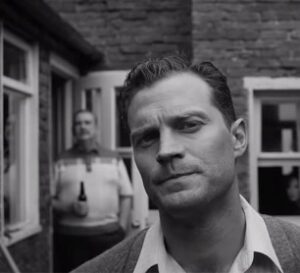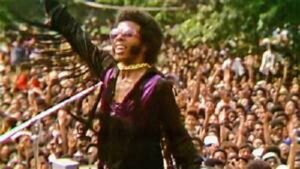Andy Ray’s Ten Best Films of 2021
Following the delayed and shortened Covid year of 2020, it was a blessing to have the motion picture industry back up-and-running – in full bloom, you might say – during 2021. Still, many films weren’t released in wide distribution until after New Year’s Day, the Oscars are postponed by one month, and the nominations won’t even be released until February 8th. So, while this list might seem somewhat deferred, keep in mind that Covid continues to alter darn near every aspect of our lives. Following are my ten best pictures of 2021:
 Iranian director Asghar Farhadi is one of the world’s most consistently productive and intriguiging filmmakers, and he didn’t disappoint this year. Farhadi’s “A Hero” tells the story of a man named Rahim who stages an act of heroism while on furlough from prison, in an attempt to relieve himself of the remainder of his sentence. But he plays his hand one too many times when the local newspaper is unable to verify all his sources. Rahim descends from local champion to pariah almost overnight. Amir Jadidi turns in one of the year’s most focused performances in this absorbing tale of righteousness and public perception. As with most Farhadi films, the media becomes the enemy of our protagonist. This ranks with “Everybody Knows” as Farhadi’s best effort so far in his career.
Iranian director Asghar Farhadi is one of the world’s most consistently productive and intriguiging filmmakers, and he didn’t disappoint this year. Farhadi’s “A Hero” tells the story of a man named Rahim who stages an act of heroism while on furlough from prison, in an attempt to relieve himself of the remainder of his sentence. But he plays his hand one too many times when the local newspaper is unable to verify all his sources. Rahim descends from local champion to pariah almost overnight. Amir Jadidi turns in one of the year’s most focused performances in this absorbing tale of righteousness and public perception. As with most Farhadi films, the media becomes the enemy of our protagonist. This ranks with “Everybody Knows” as Farhadi’s best effort so far in his career.
 In German director Maria Schrader’s “I’m Your Man,” a research scientist (Maren Eggert) participates in a three-week experiment to try out a humanoid robot whose only goal is to make her happy. On paper, this sounds like a great plan, although the robot, played by British actor Dan Stevens, is a little creepy – and just once, I’d like for him to show some anger or even a heightened emotional state. Unfortunately, as a robot he possesses no feelings – only preprogrammed responses. During the third act, “I’m Your Man” moves from a lighthearted comedy to take on a more serious tone. And that’s what sold me. Schrader doesn’t fall into the Hollywood trap of tying up all the loose ends in a nice little bow. This film leaves us with more questions than answers, and that (along with a brilliant performance from Eggert) is why I loved it.
In German director Maria Schrader’s “I’m Your Man,” a research scientist (Maren Eggert) participates in a three-week experiment to try out a humanoid robot whose only goal is to make her happy. On paper, this sounds like a great plan, although the robot, played by British actor Dan Stevens, is a little creepy – and just once, I’d like for him to show some anger or even a heightened emotional state. Unfortunately, as a robot he possesses no feelings – only preprogrammed responses. During the third act, “I’m Your Man” moves from a lighthearted comedy to take on a more serious tone. And that’s what sold me. Schrader doesn’t fall into the Hollywood trap of tying up all the loose ends in a nice little bow. This film leaves us with more questions than answers, and that (along with a brilliant performance from Eggert) is why I loved it.
 In a great year for documentaries, one of my favorites flew way under the radar last fall. Oren Jacoby’s “On Broadway” perhaps bites off more than it can chew, as essentially a review of the history of the New York theatre. But its primary concentration is the way Broadway bounced back from the dark years of the late ‘60s and early ‘70s when audiences all but stopped attending shows. While Mayor Abe Beame worked at the municipal level to clean up the streets surrounding the theatres, shows like “A Chorus Line” and “Annie” hit at just the right time to save the industry. “On Broadway” then continues to highlight the later shift away from big-budget musicals to straight theatre, then back to musicals. But Jacoby equates the lessons of the 1970s revitalization with today’s post-Covid return to live theatre in a supremely interesting and entertaining walk down memory lane.
In a great year for documentaries, one of my favorites flew way under the radar last fall. Oren Jacoby’s “On Broadway” perhaps bites off more than it can chew, as essentially a review of the history of the New York theatre. But its primary concentration is the way Broadway bounced back from the dark years of the late ‘60s and early ‘70s when audiences all but stopped attending shows. While Mayor Abe Beame worked at the municipal level to clean up the streets surrounding the theatres, shows like “A Chorus Line” and “Annie” hit at just the right time to save the industry. “On Broadway” then continues to highlight the later shift away from big-budget musicals to straight theatre, then back to musicals. But Jacoby equates the lessons of the 1970s revitalization with today’s post-Covid return to live theatre in a supremely interesting and entertaining walk down memory lane.
 Speaking of musicals, there seemed to be no reason whatsoever to remake one of the greatest stage and screen musicals ever made. But that’s exactly what Steven Spielberg did with “West Side Story.” This new version actually uses Hispanic actors to play the Puerto Rican gang members. And the singing and dancing is all top-notch (and none of the singers is dubbed). Spielberg improves upon certain aspects of the original, without completely turning it on its head. “West Side Story” is like “Fiddler on the Roof,” in that every song is memorable and great, and the music lends itself to some enduring staging. I like what Spielberg has done with this material. I still say the entire effort is somewhat unnecessary, but if Spielberg brings young fans to appreciate this greatest of American musicals, then his mission is complete.
Speaking of musicals, there seemed to be no reason whatsoever to remake one of the greatest stage and screen musicals ever made. But that’s exactly what Steven Spielberg did with “West Side Story.” This new version actually uses Hispanic actors to play the Puerto Rican gang members. And the singing and dancing is all top-notch (and none of the singers is dubbed). Spielberg improves upon certain aspects of the original, without completely turning it on its head. “West Side Story” is like “Fiddler on the Roof,” in that every song is memorable and great, and the music lends itself to some enduring staging. I like what Spielberg has done with this material. I still say the entire effort is somewhat unnecessary, but if Spielberg brings young fans to appreciate this greatest of American musicals, then his mission is complete.
 Oscar Isaac shines in the psychological drama “The Card Counter,” in which an anal retentive ex-federal prisoner finds a new, solitary life as a low-stakes gambler who drifts from casino to casino. His only goal is to make enough to afford his next meal and his next roadside motel room. He’s not given to personal interaction, although he does befriend a young man (Tye Sheridan) suffering from a mountain of student loan debt. His efforts to help, or “rescue” the young man are reminiscent of Robert DeNiro’s character in “Taxi Driver,” which was also written by Paul Schrader (no relation to Maria). Written and directed by Paul Schrader, “The Card Counter” is one of the most gripping dramas of 2021. This one flew under the radar too, and that’s a shame because it is very accessible.
Oscar Isaac shines in the psychological drama “The Card Counter,” in which an anal retentive ex-federal prisoner finds a new, solitary life as a low-stakes gambler who drifts from casino to casino. His only goal is to make enough to afford his next meal and his next roadside motel room. He’s not given to personal interaction, although he does befriend a young man (Tye Sheridan) suffering from a mountain of student loan debt. His efforts to help, or “rescue” the young man are reminiscent of Robert DeNiro’s character in “Taxi Driver,” which was also written by Paul Schrader (no relation to Maria). Written and directed by Paul Schrader, “The Card Counter” is one of the most gripping dramas of 2021. This one flew under the radar too, and that’s a shame because it is very accessible.
 Aaron Sorkin has a habit of taking complex true stories and making them palpable for wide audiences. 2017’s “Molly’s Game” (about a former Olympic skier who operated a celebrity-ridden high-stakes poker empire in Hollywood) was one of the best films of the year, and last year’s “Trial of the Chicago 7” juggled all the important characters of the post-convention riots in 1968 Chicago – yet was never difficult to follow. He’s done the same this year with “Being the Ricardos,” a surprisingly captivating look at the television empire of Lucille Ball and Desi Arnaz. Sorkin covers the gender and racial barriers broken by the central characters, but also shows Lucy’s vulnerable side. Nicole Kidman is strong in the lead role, playing against type, and J.K. Simmons turns in another top-notch supporting performance as William Frawley.
Aaron Sorkin has a habit of taking complex true stories and making them palpable for wide audiences. 2017’s “Molly’s Game” (about a former Olympic skier who operated a celebrity-ridden high-stakes poker empire in Hollywood) was one of the best films of the year, and last year’s “Trial of the Chicago 7” juggled all the important characters of the post-convention riots in 1968 Chicago – yet was never difficult to follow. He’s done the same this year with “Being the Ricardos,” a surprisingly captivating look at the television empire of Lucille Ball and Desi Arnaz. Sorkin covers the gender and racial barriers broken by the central characters, but also shows Lucy’s vulnerable side. Nicole Kidman is strong in the lead role, playing against type, and J.K. Simmons turns in another top-notch supporting performance as William Frawley.
 As a director, Kenneth Branagh turned in his best picture ever in 2021 with the autobiographical account “Belfast.” It’s a heartwarming coming-of-age story set against the backdrop of the early Catholic-Protestant clashes in Northern Ireland. Told through the eyes of a nine-year-old boy (newcomer Jude Hill), “Belfast” is more interested in the rites of passage of the boy than in the political situation. Judi Dench and Ciaran Hinds are strong as the boy’s grandparents, who are fully developed characters, vital to his upbringing during the times his father is away on business. “Belfast” is a joy, and one families with middle-school or older children can see together.
As a director, Kenneth Branagh turned in his best picture ever in 2021 with the autobiographical account “Belfast.” It’s a heartwarming coming-of-age story set against the backdrop of the early Catholic-Protestant clashes in Northern Ireland. Told through the eyes of a nine-year-old boy (newcomer Jude Hill), “Belfast” is more interested in the rites of passage of the boy than in the political situation. Judi Dench and Ciaran Hinds are strong as the boy’s grandparents, who are fully developed characters, vital to his upbringing during the times his father is away on business. “Belfast” is a joy, and one families with middle-school or older children can see together.
 Fran Krantz’ “Mass” is essentially a 90-minute discussion among four adults – the parents of a boy who was killed in a mass school shooting some years earlier, and the parents of the killer. I understand that many will not be interested in watching something this heavy, but you would be missing out on one of the most unique pieces of filmmaking to come along in many years. Never touching on the political subject of gun violence, “Mass” peels back layers of grief, trauma, and pent-up rage. All four leads are great, but it is perhaps Martha Plimpton whose touching performance hits the hardest. Her pain becomes real as she wrestles with emotions she had hoped to bury. “Mass” is not an easy film to watch, but its sheer brilliance makes it one of the most satisfying pictures of the year.
Fran Krantz’ “Mass” is essentially a 90-minute discussion among four adults – the parents of a boy who was killed in a mass school shooting some years earlier, and the parents of the killer. I understand that many will not be interested in watching something this heavy, but you would be missing out on one of the most unique pieces of filmmaking to come along in many years. Never touching on the political subject of gun violence, “Mass” peels back layers of grief, trauma, and pent-up rage. All four leads are great, but it is perhaps Martha Plimpton whose touching performance hits the hardest. Her pain becomes real as she wrestles with emotions she had hoped to bury. “Mass” is not an easy film to watch, but its sheer brilliance makes it one of the most satisfying pictures of the year.
 Ahmir Thompson’s documentary “Summer of Soul” chronicles the 1969 Harlem Cultural Festival, which featured riveting performances by many of the prominent black musicians of the day – everything from Motown to jazz to gospel to Sly Stone. Occurring the same summer as Woodstock, the Harlem concert went practically unnoticed outside of New York. Locked in a basement, no one has seen this footage in over a half-century. And the present-day interviews with the performers and organizers give “Summer of Soul” a historical dimension that “Woodstock” lacked (having been released just one year later). Unfortunately, many of the cultural changes the Harlem concert hoped to bring about are still in waiting today – and that’s the point. Yes, the music is great; but the message is universal. Perhaps something like this could be beneficial to the Black Lives Matter movement today. I loved “Summer of Soul” for its significance. And it’s always great to see Stevie Wonder, the Fifth Dimension, Mahalia Jackson, Mavis Staples and others during their primes. What a remarkable trip down memory lane!
Ahmir Thompson’s documentary “Summer of Soul” chronicles the 1969 Harlem Cultural Festival, which featured riveting performances by many of the prominent black musicians of the day – everything from Motown to jazz to gospel to Sly Stone. Occurring the same summer as Woodstock, the Harlem concert went practically unnoticed outside of New York. Locked in a basement, no one has seen this footage in over a half-century. And the present-day interviews with the performers and organizers give “Summer of Soul” a historical dimension that “Woodstock” lacked (having been released just one year later). Unfortunately, many of the cultural changes the Harlem concert hoped to bring about are still in waiting today – and that’s the point. Yes, the music is great; but the message is universal. Perhaps something like this could be beneficial to the Black Lives Matter movement today. I loved “Summer of Soul” for its significance. And it’s always great to see Stevie Wonder, the Fifth Dimension, Mahalia Jackson, Mavis Staples and others during their primes. What a remarkable trip down memory lane!
 By my count, 2021 marks the fourth year (over the past 23) that director Paul Thomas Anderson has given us the year’s best picture. And “Licorice Pizza” is unlike anything he’s ever done before. Featuring newcomers Alana Haim and Cooper Hoffman, “Licorice Pizza” tells the story of a 15-year-old burgeoning entrepreneur who spearheads his own waterbed business during the summer of 1973. Hoffman is the son of the late actor Philip Seymour Hoffman, and Haim and her sisters comprise the pop-rock band Haim. Neither possesses natural Hollywood good looks, and cinematographer Michael Bauman seems to concentrate on every facial imperfection. Their youthful energy is refreshing, and they both deserve Oscar nominations. Their love story develops slowly, and Anderson’s original screenplay features no sex. The fact that Sean Penn basically plays William Holden or that Bradley Cooper plays Jon Peters is immaterial. They could have been played by unknowns, and “Licorice Pizza” would still be the year’s best film. There is one scene that feels out of place, but that’s a minor quibble with the most original and satisfying romp of the year.
By my count, 2021 marks the fourth year (over the past 23) that director Paul Thomas Anderson has given us the year’s best picture. And “Licorice Pizza” is unlike anything he’s ever done before. Featuring newcomers Alana Haim and Cooper Hoffman, “Licorice Pizza” tells the story of a 15-year-old burgeoning entrepreneur who spearheads his own waterbed business during the summer of 1973. Hoffman is the son of the late actor Philip Seymour Hoffman, and Haim and her sisters comprise the pop-rock band Haim. Neither possesses natural Hollywood good looks, and cinematographer Michael Bauman seems to concentrate on every facial imperfection. Their youthful energy is refreshing, and they both deserve Oscar nominations. Their love story develops slowly, and Anderson’s original screenplay features no sex. The fact that Sean Penn basically plays William Holden or that Bradley Cooper plays Jon Peters is immaterial. They could have been played by unknowns, and “Licorice Pizza” would still be the year’s best film. There is one scene that feels out of place, but that’s a minor quibble with the most original and satisfying romp of the year.
Andy Ray‘s reviews also appear on https://youarecurrent.com/category/nightandday/film-reviews/